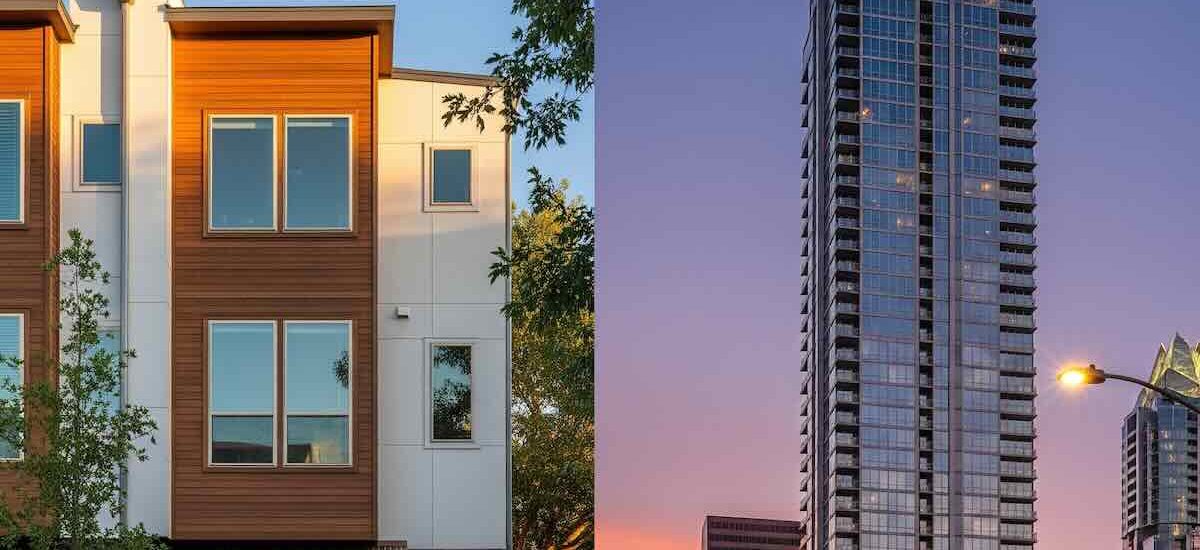What Is a Condo?
A condominium, or condo, is a privately owned unit within a larger building or complex. Residents usually own the interior of their unit, while common spaces like lobbies, gyms, or pools are shared and maintained by a Homeowners Association (HOA) or Condo Owners Association (COA). HOA fees cover upkeep, insurance, and sometimes utilities, making condo living highly convenient for those who want to avoid direct responsibility for repairs and landscaping. Condos are often located in urban centers or desirable neighborhoods, offering proximity to transit, nightlife, and work hubs. However, this convenience sometimes comes with less privacy, stricter rules on renovations, and higher density living.
Best for: Buyers prioritizing amenities, a low-maintenance lifestyle, and locations close to city action.
What Is a Townhouse?
A townhouse (or townhome) is a multi-level property that shares one or two walls with neighboring units but usually includes ownership of the home’s exterior and the land beneath it. Townhomes can be part of an HOA or a freehold (no association) the latter means the owner is responsible for all repairs, exterior maintenance, and landscaping, while the former includes benefits like snow removal or lawn care, but often with lower monthly fees than condos.
Townhouses resemble single-family homes in their vertical, side-by-side design, and typically offer more space, privacy, and exterior customization than condos.
Best for: Buyers wanting more space, a small private yard, and the feel of traditional homeownership with less communal living than an apartment or condo.
Townhouse vs Condo – Key Differences at a Glance
| Feature | Condo | Townhouse |
|---|---|---|
| Ownership | Interior only (walls-in); HOA owns exterior and shared spaces | Owns unit and land (sometimes exterior); responsibility for outside/upkeep |
| HOA Fees | Usually higher; covers more amenities and maintenance | Usually lower, especially for freehold; covers fewer shared amenities |
| Maintenance | Minimal (HOA handles most tasks) | Varies: freehold means all maintenance, HOA covers some for managed townhomes |
| Amenities | Extensive (gyms, pools, lounges, etc.) | Limited (often green space, maybe a pool) |
| Space/Privacy | Less; neighbors above, below, and beside | More; only shares 1-2 walls, often a private entrance |
| Rules/Customization | Stricter, limited changes, bylaws for appearance | More choice, especially freehold; check HOA rules if applicable |
| Resale/Investment | Often slower appreciation, reliant on market & location | Historically better appreciation, higher value in strong markets |
Pros and Cons of Townhouse vs Condo
Pros of Condos
- Lower purchase price than townhouses or single-family homes
- Extensive shared amenities (pool, fitness center, lounge)
- Maintenance and repairs often handled by HOA
- Security (doorman, cameras, restricted building access)
- Ideal for those who travel frequently or want minimal upkeep
Cons of Condos
- Less privacy and more noise from neighbors
- Monthly HOA fees can be high, even if not using all amenities
- Rules about renovations, decor, and even pets
- Limited parking and storage
- Slower property appreciation compared to townhouses or freehold homes
Pros of Townhouses
- More space, multi-level living, often with a yard or patio
- Greater privacy (fewer shared walls and a separate entrance)
- Lower (or no) HOA fees, especially for freehold
- Potential for quicker appreciation and higher resale value
- More control over appearance and improvements
Cons of Townhouses
- More maintenance responsibility: landscaping, exterior, roof, etc. if freehold
- Fewer shared amenities compared to condos
- May be located farther from city centers or transit
- Higher upfront cost than most condos
- If part of an HOA, still some rules and fees to follow
Which Is Right for You?
The decision between a townhouse and a condo should reflect your lifestyle, willingness to take on maintenance, desired amenities, location, and budget. If you value access to in-building gyms, want a turn-key, low-hassle home, and are less concerned about private outdoor space or customization, a condo is likely the better fit. It’s especially suited to singles, couples, and older buyers downsizing from a single-family house.
On the other hand, if you want more space, a yard, room to customize, and don’t mind extra responsibility for exterior care, a townhouse, especially a freehold unit, offers the perks of a house at a typically lower price point. Many young families and first-time buyers choose townhomes to enjoy more square footage while keeping a close-knit community feel, which can easily be found in places like especially if you moved from California to Texas and or decided living in South Carolina.
Conclusion: The Bottom Line
Both condos and townhouses bridge the gap between traditional apartments and single-family homes, but your priorities should guide the decision. Assess HOA fees, rules, included amenities, and resale trends in your area. Touring a few options with a real estate professional and reading HOA documents can help you make the smartest choice for your future.
Whether you opt for the ultimate convenience of condo living or the greater autonomy of a townhouse, you’ll be investing in a lifestyle that can evolve as your needs change.








